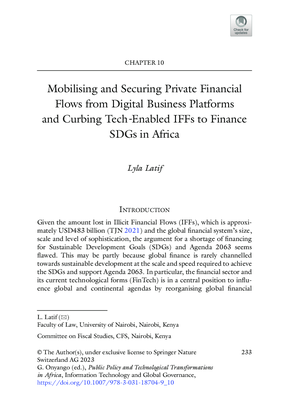Mobilising and Securing Private Financial Flows from Digital Business Platforms and Curbing Tech-Enabled IFFs to Finance SDGs in Africa

This chapter shows that digital platforms and FinTech have changed how Africans store, save, borrow, invest, move, spend and protect money (Skan, Dickerson and Gagliardi 2016). Gallup data collected by McKinsey & Company in 2014 on 44 African states showed that an average of 54 per cent of adults utilised FinTech to make payments totalling approximately 5 billion transactions annually. Overall, these flows were estimated at USD760 billion (of which 50-60% of the transactions were in cash). If a conservative estimate of revenues at 2 per cent of the volume is applied, it will result in annual revenues of about USD6.6 billion from electronic payments alone. It is now estimated that the FinTech industry in Africa today will contribute between USD200 million and USD3 billion in revenues annually (Mauritius Africa FinTech Hub). This demonstrates that the correlation between FinTech and revenue mobilisation is quite strong.
Therefore, can digital platforms and FinTech offer new financing streams for SDGs and Agenda 2063? The proceeding sections attempt to handle this question more broadly by discussing and analysing the extent to which private financial flows from digitised economic activities can be mobilised to finance SDGs. The problem with a critical examination of this proposal is that, firstly, not all digital economic activities are monitored by governments and subjected to taxation. Secondly, most of such private financial flows permeate as part of illicit finance. This is the core part on which the chapter focuses. It is necessary to understand digitally enabled IFFs if digital economic activities are to be leveraged to mobilise revenue and redistribute it towards financing SDGs. The chapter mainly presents discussions and action points to be considered in policy circles.
